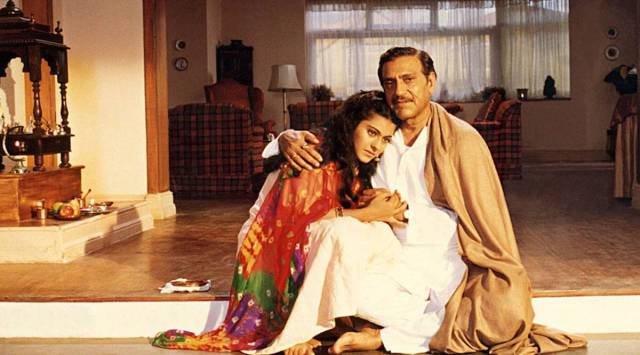📣 For more lifestyle news, click here to join our WhatsApp Channel and also follow us on Instagram
Understanding ‘good girl syndrome’, the complex that can ‘mould a woman’s sense of self’
“This complex stems from early childhood where an individual is modelled on certain behaviors that are deemed to be ‘appropriate’," said Kritika Zutshi, Clinical Psychologist, Fortis Hospital Kalyan and Mulund said
 Certain behaviours of girls are rewarded and certain frowned upon while growing up, sub-consciously ingraining ideas of what a "good girl" should be in their heads. (Representational image/ Movie still/ Dilwale Dulhania Le Jayenge)
Certain behaviours of girls are rewarded and certain frowned upon while growing up, sub-consciously ingraining ideas of what a "good girl" should be in their heads. (Representational image/ Movie still/ Dilwale Dulhania Le Jayenge) “I was a so-called ‘good girl’ until I decided to get married to someone from a different community,” recollected Vibhuti Patel, a former professor at Tata Institute of Social Sciences and SNDT Women’s University, Mumbai. Vibhuti, who grew up in a “conservative household” said she was brought up to conform to “gender norms and patriarchal ideas” until she got “politicised by reading revolutionary concepts like Marxism.” However, making personal choices that her family and their social circle did not approved of, was not at all easy.
Leeza Mangaldas, a social media influencer, shared something similar in one of her videos as she said, “I definitely suffered from something that I like to call the good girl syndrome, and I think a lot of girls would be able to relate. Growing up, I believed I had to be obedient and nice to everyone and be polite all the time, and that’s certainly the sort of messaging girls get at school. Even at home, we’re constantly taught to be the good girl and sit with our legs crossed, not make noise, and not break any rules. Basically, do what you are told. That’s the messaging that we are constantly fed as girls and it’s hard not to internalise it”.
“I realised what this temperament led to was a chronic desire to please people. A complete inability to say no and intense distaste for criticism and this obsessive and quite destructive perfectionism as well as non-stop guilt,” Leeza continued.
But what is the good girl syndrome?
Rashbha Dochania, Assistant Professor at Jindal Institute of Behavioural Sciences, defines “good girl syndrome” as “the mindset where a person strives to constantly be perceived as good, proper, and virtuous. This frequently involves putting others’ needs before their own, avoiding conflict, and trying to match societal expectations and norms”.
Speaking from her own experiences, Patel blames the “patriarchal value system” behind the good girl syndrome, where young girls are constantly told to behave and act in a certain way to be considered “good”. “This conformist behaviour is so much internalised in so many girls that even after they grow up and start working, they would take up all the work related to emotional investment and hospitality,” she told indianexpress.com.
How societal expectations perpetuate good girl syndrome
Kritika Zutshi, Clinical Psychologist, Fortis Hospital Kalyan and Mulund said that society has a significant role in the development of good girl syndrome. “It is a form of societal conditioning that often begins in childhood, in societies where people, especially women, are expected to portray themselves in a certain way — for example, to prioritise family, be passive to authority, please others, etc. This can lead to a fear of offending others, fear of rejection, or asserting themselves, as well as feelings of inadequacy and low self-esteem. It leads to an excessive need for approval, and a tendency to put others’ needs before one’s own, to fit the idea of a good girl,” she explained.
Adding, Dochania said that women are often praised when they behave mother-like, nurturing, selfless, passive, or giving. “Few girls/women who dare to break the glass ceiling or challenge the system, face judgment, criticism and even discrimination. These experiences can mould a woman’s sense of self and lead them to internalise the notions that they ought to be a ‘good girl’ to be acknowledged and respected,” she continued, adding that pop culture and media also perpetuate the ‘good girl’ image.
Agreeing, Zutshi said that this “perfection”, often portrayed in the media, tends to “preserve the stereotype of women as nurturing or passive, which can result in them feeling pressure to conform to these expectations in their real-life interactions. Secondly, reinforcement of unrealistic beauty standards for women can contribute to them feeling the need to conform to this image. This can lead to feelings of self-doubt and a need for external validation when this idealized version of self could not be curated”.
Who is more likely to suffer from a ‘good girl syndrome’?
While people may be affected by the good girl complex regardless of their gender, age, or cultural background, most of the time the syndrome can be traced back to childhood where certain behaviour and patterns were inculcated that lead to acceptance and appreciation.
 Constantly trying to please everyone, can take a toll on you. (Pic source: Pixabay)
Constantly trying to please everyone, can take a toll on you. (Pic source: Pixabay)
Zutshi explained, “This complex stems from early childhood where an individual is modelled on certain behaviours that are deemed to be ‘appropriate’. For example, households, where people are taught to prioritise the needs of others over their own can lead to a ‘good girl complex’. People who are sensitive to rejection or abandonment may more likely exhibit behaviours associated with a ‘good girl complex’ as they might feel that being nice or passive will help them maintain relationships and avoid disapproval.”
Signs/symptoms of ‘good girl complex’
“Good Girl Syndrome” is not a recognised disorder or a diagnosis. However, there are a few common behaviours that people who identify with this state of mind report. Dochania listed them as:
- Always seek validation and approval from others
- Difficulty setting boundaries and saying no to others
- Prioritise the needs of others over your own
- Feeling guilty or ashamed to express your needs and desires
- Feeling responsible for the well-being and happiness of others
- Difficulty expressing anger or assertiveness
- Overwhelmed by too much responsibility
Overcoming the good girl syndrome
For Vibhuti, breaking free from her ‘good girl’ image was very hard and isolating as all of a sudden, she says, you become an outcast for making a personal choice that according to everyone is wrong. She had to distance herself from people who were critical of her. “But, it was very hard as they were my own. However, I found solace by building connections with like-minded people, who had similar value systems”.
Leeza, too, said it was uncomfortable to do away with so many years of social conditioning and to speak up for herself. “I first realised that I suffer from the good girl syndrome when I started working and would not speak up for myself, say no to people when I was already burdened with work, and got overwhelmed with the idea of perfectionism. It took self-realisation and reflection to break free from this cycle,” she shared.
Reiterating that it is “not a clinical condition,” Dochania advises women to “practice setting healthy boundaries for yourself, treating yourself gently with kindness when you make mistakes, challenging negative thinking, and focusing more on your assets and achievements and lastly reaching out for help whenever the need arises” to overcome it.
📣 For more lifestyle news, follow us on Instagram | Twitter | Facebook and don’t miss out on the latest updates!
📣 For more lifestyle news, click here to join our WhatsApp Channel and also follow us on Instagram



- 01
- 02
- 03
- 04
- 05
























